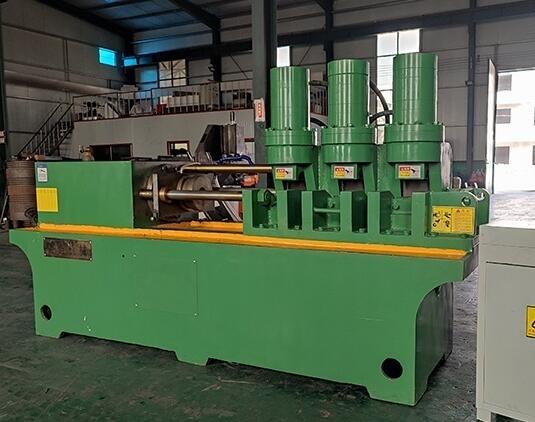Diameter reducing machine can process steel rods, rebar, round steel, and thread steel. A diameter reducing machine is a highly versatile tool used in various industries to alter the diameter of rods, pipes, and cylindrical workpieces with precision and efficiency. Its ability to handle a wide array of materials makes it an indispensable asset in manufacturing processes across sectors like automotive, construction, aerospace, and more. Understanding the types of materials a diameter reducing machine can process is crucial for manufacturers looking to optimize their production while maintaining quality standards.

1. Carbon Steel
Carbon steel is one of the most widely processed materials in diameter reducing machines due to its strength, durability, and cost-effectiveness. Common applications of reduced-diameter carbon steel include structural frameworks, automotive components, and industrial machinery parts.
- Properties: High tensile strength, good machinability, and availability in various grades.
- Challenges: Requires machines with robust dies to handle the material’s hardness and prevent wear during high-volume production.
2. Stainless Steel
Stainless steel is favored for its corrosion resistance, making it ideal for industries requiring high durability in harsh environments. Diameter reducing machines are commonly used to process stainless steel rods and tubes for applications like medical devices, food processing equipment, and decorative architectural components.
- Properties: Corrosion resistance, strength, and a polished surface finish.
- Considerations: Requires precision tools and well-lubricated processes to avoid surface damage during reduction.
3. Aluminum and Aluminum Alloys
Aluminum is lightweight, strong, and corrosion-resistant, making it a staple material for aerospace, automotive, and construction applications. Diameter reducing machines excel at shaping aluminum rods and tubes into components like fuel lines, aircraft structural parts, and lightweight machinery components.
- Properties: Lightweight, high corrosion resistance, and excellent conductivity.
- Applications: Industries prioritizing weight reduction without compromising strength.
4. Copper and Brass
Copper and brass are widely used in electrical, plumbing, and decorative applications. Their malleability and excellent conductivity make them suitable for processing in diameter reducing machines.
- Copper Properties: High electrical and thermal conductivity.
- Brass Properties: Corrosion resistance, aesthetic appeal, and good machinability.
5. Titanium
Titanium is a high-performance material known for its strength-to-weight ratio and corrosion resistance. It is commonly used in aerospace, medical, and high-end automotive applications.
- Properties: Lightweight, corrosion-resistant, and biocompatible.
- Challenges: Requires high-precision tools and optimized machine settings to avoid material fatigue during reduction.
6. Alloys for Aerospace Applications
Advanced alloys such as Inconel, Hastelloy, and Monel are known for their performance in high-stress and high-temperature environments. Diameter reducing machines play a critical role in shaping these alloys into components like engine parts and exhaust systems.
- Properties: High-temperature resistance, strength, and corrosion resistance.
- Challenges: Require specialized machines with advanced cooling systems and hardened dies.
7. Plastics and Polymers
Certain diameter reducing machines can also process rigid plastics and polymers, commonly used in lightweight structural components, piping systems, and insulation products.
- Properties: Lightweight, corrosion-resistant, and non-conductive.
- Applications: Construction, electronics, and consumer goods industries.
Why Material Versatility Matters
For manufacturers, the ability to process diverse materials enhances production flexibility and cost-effectiveness. High-quality machines, such as those provided by JUSHI, are designed to accommodate a wide range of materials, helping businesses meet stringent quality standards and industry demands.
Industry Insights and Market Trends
The global demand for diameter reducing machines continues to grow due to their role in processing lightweight and high-strength materials. For instance, the automotive industry increasingly uses aluminum to improve fuel efficiency, while the aerospace sector relies on advanced alloys for superior performance.
According to industry reports, the metal forming tools market is projected to grow at a compound annual growth rate (CAGR) of over 5% from 2023 to 2030.






